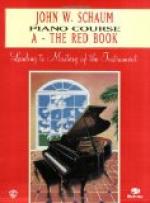“Pianissimo is one of the later things to teach. A beginner should not attempt it too soon, for then it will only result in flabbiness. A true pianissimo is not the result of weakness but of strength.
MUSICAL CONDITIONS IN AMERICA
“America has made marvelous progress in the understanding and appreciation of music; even the critics, many of them, know a great deal about music. The audiences, even in small towns, are a pleasure and delight to play to. I am asked sometimes why I attempt the last sonata of Beethoven in a little town. But just such audiences listen to that work with rapt attention; they hang on every note. How are they to learn what is best in music unless we are willing to give it to them?
“The trouble with America is that it does not at all realize how much it knows—how much talent is here. We are so easily tricked with a foreign name and title; our serious and talented musicians are constantly being pushed to the wall by some unknown with a name ending in ski. These are the people who tour America (for one season at least), who get the best places in our music schools and colleges, crowding out our native musicians. It makes me very bitter against this utterly mistaken and fallacious idea of ours. I have many talented students, who come to me from all over the country. Some of them become most excellent concert artists. If I recommend them to managers or institutions, should not my word count for something? Ought I not to know what my students can do, and what is required of a concert artist? But instead of their securing an engagement, with such a recommendation, a foreigner with the high-sounding name is the one invariably chosen. When I first started on my career I endeavored in every way to get a proper hearing in America. But not until I had made a name for myself in Europe was I recognized here, in my own land. All honor to those who are now fighting for the musical independence of America!”
A GROUP OF QUESTIONS
Not long after the above conversation with Mme. Zeisler, I jotted down some questions, leading to further elucidation of her manner of teaching and playing, and sent them to her. The artist was then fully occupied with her long and arduous tours and later went to Europe. My questions remained unanswered for nearly a year. When she next played in New York, she sent for me to come to her hotel. As she entered the room to greet me, she held in her hand the paper containing the questions. I expressed surprise that she had preserved the bit of paper so long.
“I am very conscientious,” she answered; “I have kept this ever since you sent it, and now we will talk over the topics you suggest.”
(1) What means do you favor for gaining power?




